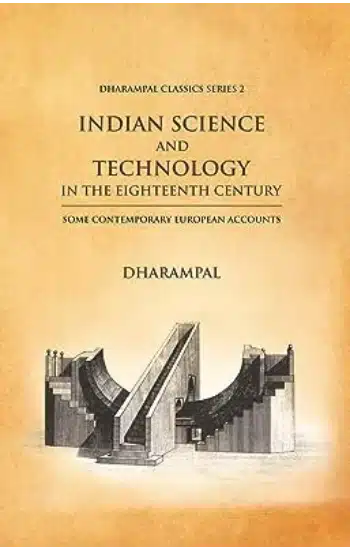
Save: 15%
INDIAN SCIENCE AND TECHNOLOGY IN THE EIGHTEEN CENTURY (Vol 2)
Publisher:
| Author:
| Language:
| Format:
Publisher:
Author:
Language:
Format:
₹350 ₹349
Save: 0%
In stock
Ships within:
In stock
| Weight | 590 g |
|---|---|
| Book Type |
ISBN:
Page Extent:
Indian Science and Technology in the Eighteenth Century (1971) is the first of Dharampalji’s books based on the materials collected in the course of his extensive study in the British archives. It compiles several articles by early British officers, scholars and observers about the Indian Science of astronomy and mathematics and the Indian technological practices in metallurgy, agriculture, architecture and medicine, etc. The book created a new appreciation of the sophistication and efficacy of Indian science and technologies before the coming of the British.
Indian Science and Technology in the Eighteenth Century (1971) is the first of Dharampalji’s books based on the materials collected in the course of his extensive study in the British archives. It compiles several articles by early British officers, scholars and observers about the Indian Science of astronomy and mathematics and the Indian technological practices in metallurgy, agriculture, architecture and medicine, etc. The book created a new appreciation of the sophistication and efficacy of Indian science and technologies before the coming of the British.
About Author
Dharampal's commitment to regenerating India's rural population led him to work with Mirabehn, Gandhiji's disciple, and later, in the 1950s, he founded a cooperative village near Rishikesh. During the Partition in 1947-48, he played a crucial role in the rehabilitation of refugees and became a founding member of the Indian Cooperative Union in 1948.
In the years 1958-1964, Dharampal served as the General Secretary of the Association of Voluntary Agencies for Rural Development (AVARD) and later as the Director of Study and Research of the All India Panchayat Parishad until 1965. His association with Sri Jayaprakash Narayan during this time was particularly noteworthy.
From 1966 onwards, Dharampal dedicated nearly two decades to exploring Indian archives in the British Isles, publishing seminal works such as "Indian Science and Technology in the Eighteenth Century" (1971), "Civil Disobedience and Indian Tradition" (1971), and "The Beautiful Tree: Indigenous Indian Education in the Eighteenth Century" (1983). These works challenged conventional views of Indian history, revolutionizing our understanding of Indian cultural, scientific, and technological achievements on the eve of British conquest.
In the 1980s, Dharampal's guidance inspired the People's Patriot Science and Technology (PPST) group. He served on the Indian Council of Historical Research (ICHR) intermittently between 1987 and 2001 and was appointed Chairman of the National Commission on Cattle in 2001.
Dharampal maintained a close association with Mahatma Gandhi's Sevagram Ashram from the mid-1980s until his passing on October 24, 2006. Throughout his life, he remained committed to the intellectual, cultural, social, economic, and political welfare of Indian society. His legacy, marked by groundbreaking historical investigations, challenges the colonial indoctrination-induced assumptions of India's underdevelopment before British rule. Dharampal's call for an 'intellectual-psychological unburdening' and the regeneration of Indian societal institutions from within remains relevant, urging current generations to draw inspiration from his pioneering example to create a dynamic India that leads the world.
Reviews
There are no reviews yet.



Reviews
There are no reviews yet.